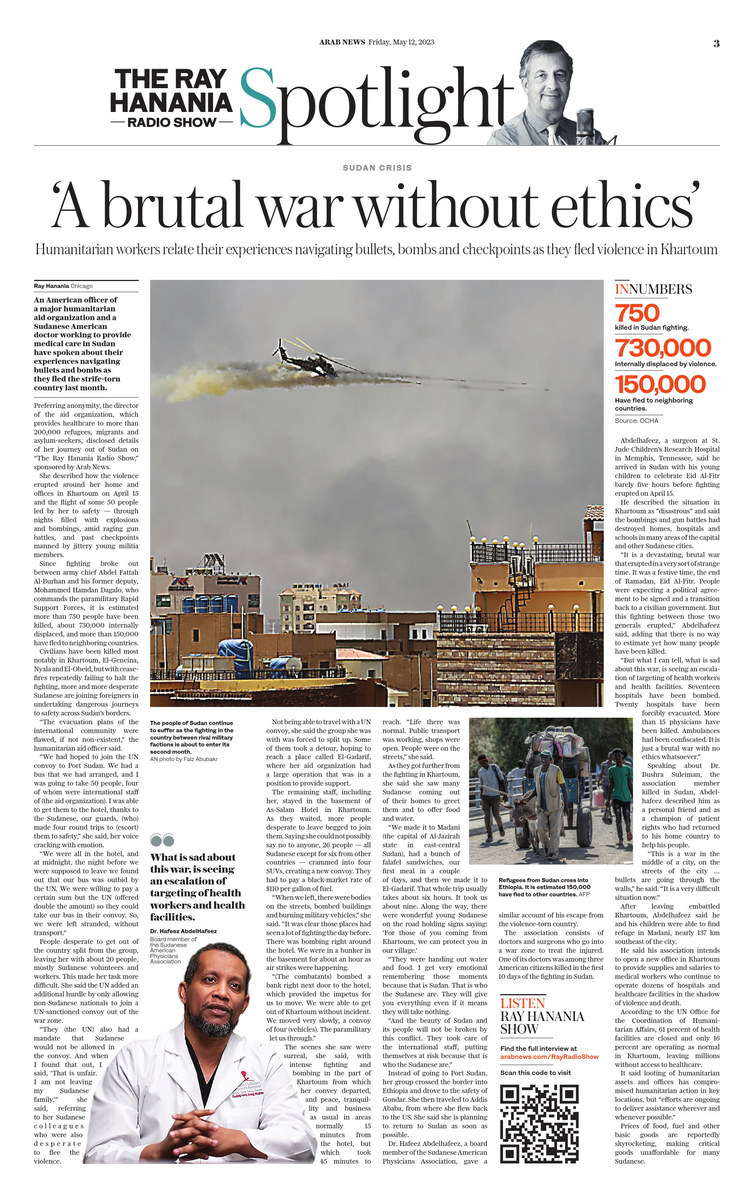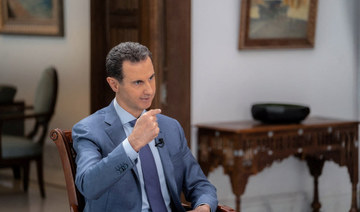CHICAGO: The American director of a major humanitarian aid organization and a Sudanese doctor working to provide medical care in the African country have shared their personal experiences navigating bullets and bombs as they fled the violence in Sudan last month.
Preferring anonymity, the woman director of the major NGO that provides healthcare to more than 200,000 refugees, migrants and asylum seekers, shared details of her story on The Ray Hanania Radio Show sponsored by Arab News.
She described how the violence erupted around her home and offices in Khartoum on April 15 and the harrowing exodus of some 50 people she led to safety — through warring factions, nights filled with explosions and bombings, as well as checkpoints manned by jittery young armed militia members.
“The evacuation plans by the international community were flawed if not nonexistent. We had hoped to join the UN convoy to Port Sudan. We had a bus that we had arranged. And I was going to take 50 people, four who are international staff of mine that we were able to get from my international staff to the hotel, thanks again to the Sudanese, our guards, (who) made four round trips to get them to safety,” she said, her voice cracking with emotion.
“We were all in the hotel and at midnight the night before we were supposed to leave (but) we found out that our bus was outbid by the UN. So we were willing to pay a certain amount and the UN doubled it so they could take our bus in their convoy. So we were left stranded without transport.”
People desperate to get out split from the group leaving her with about 20 people, mostly Sudanese volunteers and workers. Making it more difficult. She said the UN added an additional hurdle by only allowing non-Sudanese nationals to join the UN-sanctioned convoy out of the war zone.
“They (the UN) also had a mandate that Sudanese would not be allowed in the convoy. And when I found that out, I said that is unfair. I am not leaving my Sudanese family,” she said, referring to the growing entourage of scared people desperate to flee the violence.
Not being able to travel with a UN convoy, she said the group she was with was forced to regroup. They detoured hoping to get to El-Gadarif (Al-Qadarif) where her NGO also had a large operation and would be able to help.
The remaining group stayed in the basement of the As-Salam Hotel in Khartoum. As they waited, more people desperate to leave begged to join them. Saying she could not possibly say no to anyone, they packed 26 people, all Sudanese except for six other nationals, into four sports utility vehicles, creating a new convoy. They had to pay a black-market rate of $110 per gallon of gasoline for the vehicles.
“When we left, there were bodies on the street, buildings bombed out. Military vehicles burned out. It was clear there had been the day before a lot of fighting. There was bombing right around the hotel. We were in a bunker in the basement for about an hour as air strikes were happening,” she recalled.
“They bombed a bank right next door to the hotel, which was the impetus for us saying we have got to move. We were able to get out of Khartoum without incident. We were moving very slowly, the convoy of four (vehicles). The paramilitary let us through.”
The scenes she saw were bizarre, with intense violence and bombing in some areas and peace and tranquility and business as usual in areas just 15 minutes away from the hotel, that took 45 minutes to navigate. “Life was normal. Public transport was working, shops were open. People were on the streets.”
As they got further away from the fighting in Khartoum, she said the Sudanese in homes they passed came out and greeted convoys and offered food and water to those fleeing the fighting.
“We made it to Madani, had a bunch of falafel sandwiches, our first meal for a couple of days and then we made it to Gadarif. That whole trip usually takes about six hours. It took us about nine. Along the way, there were beautiful young Sudanese on the road holding signs saying: ‘For those of you coming from Khartoum we can protect you in our village.’
“They were handing out water and food. I get very emotional remembering those moments because that is Sudan. That is who the Sudanese are. They will give you everything even if it means they will take nothing. And the beauty of Sudan and its people will not be broken by this conflict. They took care of the international staff, putting themselves at risk because that is who the Sudanese are.”
Instead of going to Port Sudan, they instead crossed the border into Ethiopia and drove to the safe environs of Gondar. She then traveled to Addis Ababa, from where she recently flew back to the US. She said she is planning to return to Sudan as soon as possible.
Dr. Hafeez AbdelHafeez, a board member of the Sudanese American Physicians Association and surgeon with St. Jude Children’s Research Hospital, shared a similar story. SAPA consists of doctors and surgeons who went into the war zone to treat the injured. Two Americans and one SAPA doctor, Dr. Bushra Suleiman, had been killed 10 days after the fighting began.
AbdelHafeez said he arrived in Sudan with his young children to celebrate Eid Al-Fitr only five hours before the fighting erupted on April 15. He described the situation in Khartoum as “disastrous” and said the bombings and gunfights destroyed homes, hospitals and schools in many areas of Khartoum and other Sudanese cities.
“It is a devastating, brutal war that erupted in a very sort of strange time. It was a festive time. The end of Ramadan. The Eid. People were expecting a political agreement to be signed and to transition the government back to civilian government. And then this fighting between those two generals erupted,” AbdelHafeez said, adding that there was no way to immediately estimate how many people have been killed.
“But what I (can) tell, what is sad about this war is seeing an escalation on targeting health workers and health facilities. Seventeen hospitals (have) been bombed. Twenty hospitals (have) been forcefully evacuated. More than 15 physicians (have) been killed. And you know ambulances had been confiscated. It is just a brutal war with no ethics whatsoever.”
AbdelHafeez said Suleiman was a personal friend. He described him as a champion for patient rights who went back home to help his people.
“This is a war in the city, on the streets of this city … Bullets going through the wall,” he said. “It is a very difficult situation now.”
While Khartoum was under siege, he said he and his children were able to find refuge in the Sudanese city of Madani.
AbdelHafeez said SAPA plans to open a new office in Khartoum to provide supplies and salaries to medical workers who are operating dozens of hospitals and healthcare facilities.
You can listen to the radio show’s podcast by visiting ArabNews.com/rayradioshow.
























